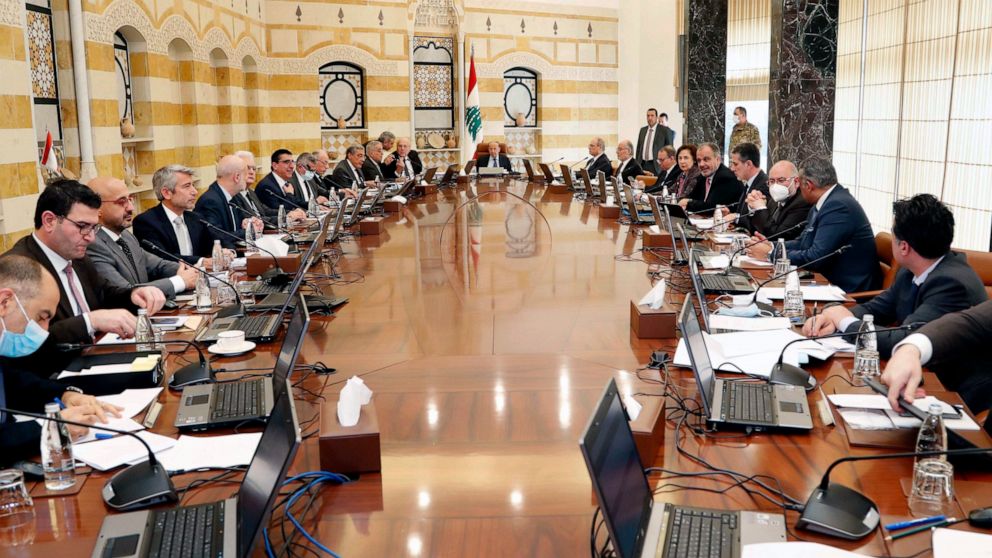by gulfnews.com — Khitam Al Amir, Chief News Editor — Dubai: An audio-recorded threat from a Saudi dissident to attack the kingdom’s …
NNA – The Lebanese Army Command on Wednesday announced in a statement that the logistic brigade has received 150 Humvees through Beirut …

by trenddetail.com -- (translated from arabic) Attempts to impose a “new government” through new decrees have suggested the predominance of serious efforts over the turbulent movement against the Free Patriotic Movement and its leadership, according to what was indicated by the “brigade” in its issue last Monday. From this angle, and in parallel with the revitalization of international and regional efforts to reach an understanding on a new President of the Republic, Prime Minister-designate Najib Mikati will visit Baabda Palace, and President Michel Aoun will meet to discuss the government file, from the angle of the 24 ministers he submitted to the President of the Republic on June 29, and the amendments Required, or to disregard any change, as well as looking into the possibility of forming a government of 30 ministers, adding 6 ministers of state to the current government, in terms of numbers. Yesterday, visitors to Baabda conveyed the president’s desire to form a new government in agreement with the designated prime minister in accordance with the rules of the constitution and national partnership, and to give the opportunity to discuss to reach a practical understanding.
Well-informed political sources pointed out to the “Liwaa” that the morning meeting between the President of the Republic and the designated president will continue the discussion of the government file, without meaning that the decision is approaching. She confirmed that Presidents Aoun and Mikati will google the formation without knowing whether the points of disagreement have been reduced in terms of the President of the Republic’s approval of replacing the Minister of Economy and Minister of Energy. On the other hand, former MP Walid Jumblatt refused to nominate any Druze candidate as an alternative to the Minister of the Displaced, Essam Sharaf al-Din.

By NADIA AL-FAOUR -- arabnews.com -- DUBAI: Even before the economic collapse in Lebanon, Syrian and Palestinian refugees living there were struggling to get by. Many chose to uproot themselves once again and set out in search of greater security overseas, often turning to people smugglers for help. Now, the situation looks so hopeless that a growing number of Lebanese citizens who lack the means to pay for safe and legal passage abroad are also risking the same dangerous, illegal sea crossings to Europe. In early June, the Lebanese military apprehended 64 people in the north of the country who were attempting to board a smuggling vessel bound for Cyprus. Among them were several Lebanese citizens, driven to desperation by severe economic hardship. “I cannot feed my family. I feel like less of a man every day,” Abu Abdullah, a 57-year-old delivery worker from Tripoli, the poorest city in the country, told Arab News. “I would rather risk my life at sea than hear the cries of my children when they grow hungry.”
Inflation, unemployment, shortages of food, fuel and medicine, a crumbling healthcare system, and dysfunctional governance have created a perfect storm of poverty and hopelessness. Shortage of grain as a result of the war in Ukraine has compounded Lebanon’s economic woes, with the prices of staples skyrocketing. Queues for bread are a common sight in many towns while public-sector workers have often gone on strike demanding better pay. The nation’s currency has lost about 95 percent of its value since 2019. As of July, the minimum monthly wage was worth the equivalent of $23 based on the black market exchange rate of 29,500 Lebanese pounds to the dollar. Before the financial collapse, it was worth $444. About half of the population now lives below the poverty line. “My salary barely lasts a few weeks and the tips I get amount to nothing,” said Abu Abdullah. “One of my sons roams around the neighborhood dumpster diving, looking for tins and plastic to sell. It breaks my heart having to see him do this. But in order to eat we don’t have another choice.”
Khazen History


Historical Feature:
Churches and Monasteries of the Khazen family

St. Anthony of Padua Church in Ballouneh
Mar Abda Church in Bakaatit Kanaan
Saint Michael Church in Bkaatouta
Saint Therese Church in Qolayaat
Saint Simeon Stylites (مار سمعان العامودي) Church In Ajaltoun
Virgin Mary Church (سيدة المعونات) in Sheilé
Assumption of Mary Church in Ballouneh
1 - The sword of the Maronite Prince
2 - LES KHAZEN CONSULS DE FRANCE
3 - LES MARONITES & LES KHAZEN
4 - LES MAAN & LES KHAZEN
5 - ORIGINE DE LA FAMILLE
Population Movements to Keserwan - The Khazens and The Maans
ما جاء عن الثورة في المقاطعة الكسروانية
ثورة أهالي كسروان على المشايخ الخوازنة وأسبابها
Origins of the "Prince of Maronite" Title
Growing diversity: the Khazin sheiks and the clergy in the first decades of the 18th century
Historical Members:
Barbar Beik El Khazen [English]
Patriach Toubia Kaiss El Khazen(Biography & Life Part1 Part2) (Arabic)
Patriach Youssef Dargham El Khazen (Cont'd)
Cheikh Bishara Jafal El Khazen
Patriarch Youssef Raji El Khazen
The Martyrs Cheikh Philippe & Cheikh Farid El Khazen
Cheikh Nawfal El Khazen (Consul De France)
Cheikh Hossun El Khazen (Consul De France)
Cheikh Abou-Nawfal El Khazen (Consul De France)
Cheikh Francis Abee Nader & his son Yousef
Cheikh Abou-Kanso El Khazen (Consul De France)
Cheikh Abou Nader El Khazen
Cheikh Chafic El Khazen
Cheikh Keserwan El Khazen
Cheikh Serhal El Khazen [English]
Cheikh Rafiq El Khazen [English]
Cheikh Hanna El Khazen
Cheikha Arzi El Khazen
Marie El Khazen